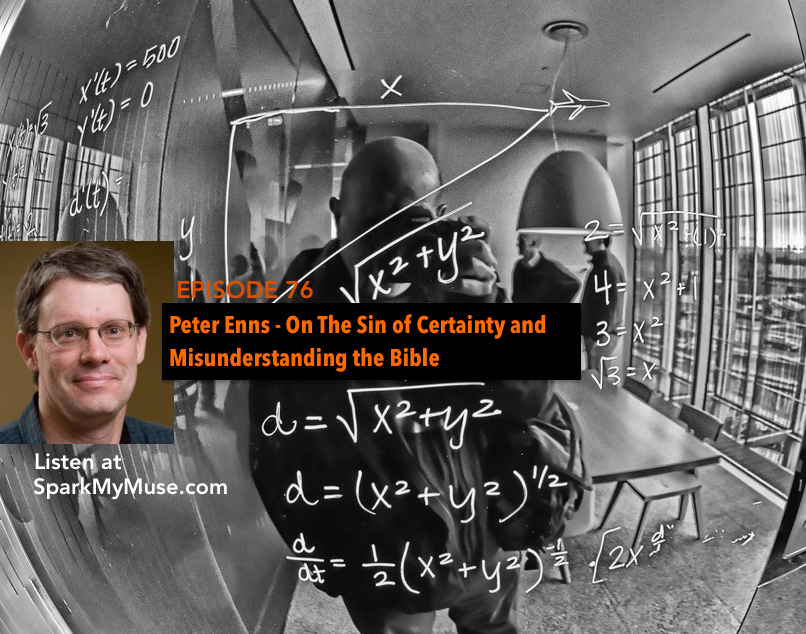Welcome to Spark My Muse!
HOW FUNDING WORKS:
Spark My Muse is heard in 174 countries!
Help out by giving a gift, now and then.
Thank you for ANY amount, even $5 or $10, you can give today.
OR find more goodies as a Patreon Supporter
The power of sharing an audio clip from this episode is in your grasp! Just click on the handy Clammr icon below.
Podcast: Play in new window | Download (Duration: 39:43 — 54.6MB) | Embed
Subscribe to Spark My Muse Apple Podcasts | Spotify | Email | TuneIn | RSS | Subscribe to Spark My Muse
Peter Enns’s website (with a new podcast as of MARCH 2017)
Hear other recent episodes:
SHOW NOTES to Eps 76:
MIN 1:00 Who is Peter Enns?
MIN 2:00
What was the path that led to writing “The Sin of Certainty”
Pete’s controversy? Wait. What?
MIN 4:30
On uncomfortable things.
Suggestion alternate ways of thinking that are compelling that alone can be too uncomfortable and resisted sometimes.
Centrist background and when went to Westminster Seminary and taught there.
Inspiration and Incarnation (book link) The problem on the OT.
MIN 8:30
Adam – BioLogos
The Evolution of Adam
Genesis and Science speak two different languages.
Medieval Jewish readings of the Genesis story Adam reflects and parallel the story of Israel and paradise land.
Adam as a symbol, theme, or pattern. Be aware of literary structure.
Bible written as thoughtful theology not history (or science). Written as the story of Israel that show their ideology. (and identity)
MIN 13
[ictt-tweet-inline via=””]Literalism is a modernist reading strategy [of the Bible].[/ictt-tweet-inline]
(To share this nifty quote above on TWITTER, it takes 4 seconds. Just click the blue bird icon. And keep your eyeballs open for other easy-to-tweet quotes throughout these show notes.)
Different books of the people (in different eras) adjust and revise other parts of scripture.
[ictt-tweet-inline via=””]I find that the most conservative way of reading the Bible is the most unbiblical.[/ictt-tweet-inline]
MIN 15
Pete, what do you mean by “GOD”? (and how he encounters that in his newest book.)
Using the word “God” is almost lazy.
MIN 19:30
[ictt-tweet-inline via=””]There is no one portrayal of God in the Bible.[/ictt-tweet-inline]
It changes depending on the culture, theology, time, circumstances, and author or authors writing the book. The New Testament comes from the Old Testament trajectory.
MIN 22:00
[In Paul’s letters] Paul [is] trying to make sense of Jesus when it’s a radical departure from Jewish thought.
[The bible is] [T]he development of how humans think about God. The tribal God is warlike [is one example].
[ictt-tweet-inline via=””]The “biblical God” is the God we see through our own lens.[/ictt-tweet-inline]
MIN 25:00
God in our image.
[ictt-tweet-inline via=””]“It’s not just that we use psychology, we ARE psychology.”[/ictt-tweet-inline]
[ictt-tweet-inline via=””]“All theology is psychology and sociology, [because] we are people who live in communities and people with histories.”[/ictt-tweet-inline]
[ictt-tweet-inline via=””]“God allows [God’s] children to tell [God’s] story from where they are from their perspective.”[/ictt-tweet-inline]
Hold with an open fist.
MIN 28:30
The mystery of the Incarnation and how we see the world.
[ictt-tweet-inline via=””]“Jesus is the model and Savior and messy and a 1st century Jewish man.”[/ictt-tweet-inline]
What’s the divine part of Christology?
MIN 32:00
How has Pete’s personal concepts of God have evolved?
My experience of God is not irrelevant and not relegated to just the academic and the life of the modernist mind.
(Eastern) Orthodox “God as Being” (rather than a Being)
When you think of God what do you think of?
God is in you and without God there is nothing. And God is all around you. (New ideas for Pete).
MIN 37:00
What’s around the corner for Pete Enns.
Pick the best option for you below:





